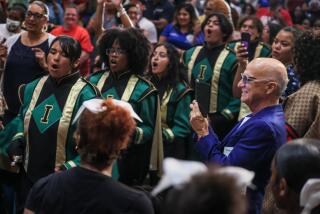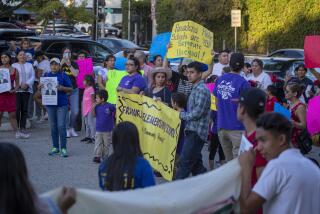Japanese Educators Ask for Palos Verdes School
- Share via
A private Japanese university has approached Palos Verdes school officials about buying or leasing the vacant Dapplegray Intermediate School to open a high school for Japanese students.
The school, which would serve grades seven through 12, would primarily serve Japanese executives’ children who plan to attend college in Japan, according to Sid Kanazawa, a Los Angeles attorney representing Nihon University.
“The idea of the school is to provide an option to families that have been relocated to the United States,” said Kanazawa, who compared the school to those that Americans have established in Japan and other countries.
Palos Verdes Peninsula Unified School District board members have asked Nihon University for more information. The board has said it is not willing to sell Dapplegray, which was closed in 1987 because of the district’s declining enrollment.
Last year, the district attempted to lease the 40-acre site in Rolling Hills Estates but received no proposals. District officials are trying to determine a rent for the site.
School board President Jack Bagdasar said in an interview this week that he is intrigued with the idea of leasing the site to Nihon, which has schools throughout Japan. He said such a high school could broaden cross-cultural programs for peninsula students and generate new money for the district, which has projected a deficit of more than $2 million in the $33 million operating budget for the upcoming fiscal year.
“I think it is really exciting in a lot of ways, and I guess the way I think it is most exciting is that we would be getting some revenue,” Bagdasar said.
However, Bagdasar said, a major concern is whether the high school would draw students from Palos Verdes schools. The district receives state funding based on the number of pupils enrolled in its schools. Asian students represent 28% of the student body in Palos Verdes, but district officials say they do not know how many are Japanese citizens.
“We have to confront the issue of do we believe in leasing to a private school that could be competitive in taking enrollment away from a public school?” he said.
Kanazawa said Nihon is also looking at other sites besides Dapplegray but declined to disclose details. Nihon, through a foundation affiliated with it, is hoping to work out some sort of agreement with Palos Verdes school officials by this summer or “move on,” Kanazawa said. The university wants to have a high school open in the United States by 1991, he said.
“We think that with respect to (the Dapplegray) site, it is a win-win situation because right now it is vacant,” he said. “ . . . All they have is a building that is deteriorating on a piece of property that is not being used other than for Little League and soccer.
“We’re trying to get it past the stage of just idle discussion, and if the school board is willing and can move on this thing, then we can get down to very serious discussions,” he added.
According to the Japanese Business Assn. of Southern California, 265 Japanese companies have branch operations in the area stretching from Cerritos west to the beach cities. In recent years, a number of part-time and full-time Japanese schools and tutoring services have sprung up to serve the children of Japanese executives on temporary assignment here.
The association says there are an estimated 3,700 Japanese citizens in Los Angeles and Orange counties who attend Japanese schools or tutorial classes. They have no figure for the total number of Japanese school-age children.
Kanazawa said the high school would mostly serve Japanese students who intend to return to Japan for college. Many such students who attend American high schools find it difficult to obtain high marks on their college entrance exams, he said.
Japanese instructors would teach students the same curriculum taught in Japanese high schools. Nihon hopes to provide dormitory space on campus.
Nihon has 70,000 students enrolled on campuses throughout Japan, Kanazawa said. The university has distinguished itself for its law, medicine, engineering and art programs, he said.
The university also operates junior and senior high schools in Japan, with a total enrollment of about 20,000, he said.
More to Read
Sign up for Essential California
The most important California stories and recommendations in your inbox every morning.
You may occasionally receive promotional content from the Los Angeles Times.













